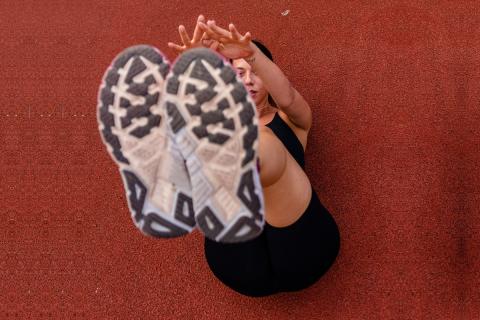
Tired, Heavy Legs While Running? Here’s How to Fix It
Published on March 6 by Matt
Feeling like your legs are weighed down during a run can be frustrating, especially when you're otherwise well-rested and ready to go. Heavy legs can be caused by a variety of factors, from muscle fatigue to improper hydration. Let’s break down the common causes and the best ways to fix them so you can get back to running smoothly.
Why Do My Legs Feel Heavy When Running?
There are several reasons why your legs might feel sluggish and unresponsive during a run:
1. Muscle Fatigue and Overtraining
If you've been logging too many miles without adequate recovery, your muscles may not have enough time to repair. Overtraining leads to microtears in muscle fibers, causing soreness and that dreaded heavy-leg feeling.
Fix:
✔ Reduce mileage or intensity for a few days.
✔ Incorporate active recovery, like walking or light stretching.
✔ Ensure rest days are part of your training plan.
2. Dehydration and Electrolyte Imbalance
When you're dehydrated, blood flow to the muscles decreases, making them feel tired and stiff. Low electrolytes, especially sodium, potassium, and magnesium, can also contribute to muscle cramping and fatigue.
Fix:
✔ Drink plenty of water throughout the day.
✔ Include electrolyte-rich drinks or foods (bananas, leafy greens, nuts) in your diet.
✔ Avoid excessive caffeine or alcohol, which can lead to dehydration.

3. Poor Blood Circulation
When blood flow to the legs is reduced, oxygen and nutrients don’t reach your muscles efficiently, leading to heaviness and sluggishness. This can happen if you:
- Sit for long periods before a run.
- Run in cold weather (which constricts blood vessels).
- Have tight clothing that restricts circulation.
Fix:
✔ Do a dynamic warm-up to improve blood flow before running.
✔ Try compression socks to encourage circulation.
✔ Avoid sitting for long periods before a run—stand up and move around.
4. Low Iron Levels (Anemia)
Iron is essential for delivering oxygen to muscles. Low iron levels can result in low energy, heavy legs, and poor endurance, especially for female runners or those following a restrictive diet.
Fix:
✔ Include iron-rich foods (spinach, red meat, beans) in your diet.
✔ Pair iron sources with vitamin C (citrus, bell peppers) for better absorption.
✔ If symptoms persist, consult a doctor for blood tests.
5. Running Too Soon After Eating
Eating a large meal right before a run forces your body to divert blood flow to digestion instead of your muscles, making your legs feel slow and unresponsive.
Fix:
✔ Eat a small, easily digestible carb-based snack 30–60 minutes before running.
✔ Avoid high-fat, high-fiber foods close to workout time.
6. Weak or Tight Muscles
Imbalances in muscle strength, particularly in the glutes, hamstrings, and calves, can lead to inefficient running form and heavy legs. Tight muscles also limit your range of motion, making each step feel harder.
Fix:
✔ Strength train twice a week to build leg and core strength.
✔ Stretch and foam roll after runs to maintain flexibility.
✔ Perform drills like high knees, lunges, and butt kicks before running.

7. Sleep Deprivation and Stress
Lack of sleep and high stress levels impair muscle recovery, hormone balance, and energy levels, making your legs feel tired even before you start running.
Fix:
✔ Aim for 7–9 hours of sleep per night.
✔ Manage stress with breathing exercises or meditation.
✔ Take a break from intense training when needed.
8. Running Shoes That Don’t Fit Well
Old or improper running shoes fail to absorb impact, making your legs work harder and feel heavier.
Fix:
✔ Replace running shoes every 300–500 miles.
✔ Get fitted for proper shoes at a running store.
How to Prevent Heavy Legs While Running
To avoid sluggish legs in future runs, follow these key tips:
✅ Warm Up Properly – Start with 5–10 minutes of dynamic stretching and easy jogging.
✅ Hydrate & Fuel Well – Drink enough water and eat balanced meals.
✅ Train Smart – Avoid overtraining, and include strength exercises in your routine.
✅ Rest & Recover – Take rest days and prioritize good sleep.
✅ Choose the Right Shoes – Get well-cushioned, supportive footwear.
Heavy legs while running can be caused by fatigue, poor hydration, circulation issues, or nutritional deficiencies. By identifying the root cause and making the right adjustments, you can regain your energy and run feeling light and strong.